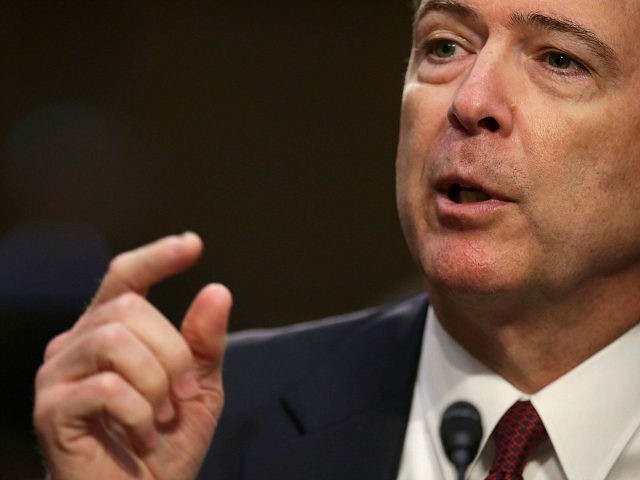In his recently released memoir, former FBI Director James Comey was highly critical of Rudy Giuliani, describing the former United States Attorney and NYC mayor as publicity hungry and lacking humility, while accusing Giuliani of using criminal cases as a public attorney to further his own political ambitions.
In his book, Comey likened Giuliani, now a member of President Trump’s legal team, to an “emperor” ruling over an office of “underlings” who were not allowed to steal Giuliani’s spotlight.
Comey described working under Giuliani at the United States Attorney’s office in New York. Eventually, Comey would fill Giuliani’s shoes and himself become U.S. Attorney for the Southern District of New York.
When he first joined the U.S. Attorney’s office, Comey claimed there was “something of an unwritten code” in which “Rudy was the star at the top and the successes of the office flowed in his direction. You violated this code at your peril.”
Comey wrote that he thought Giuliani “had extraordinary confidence, and as a young prosecutor I found his brash style exciting, which was part of what drew me to his office.” However, Comey says that “it took me a while to realize that Giuliani’s confidence was not leavened with a whole lot of humility. The cost of that imbalance was that there was very little oxygen left for others.”
The embattled former FBI chief claimed that Giuliani’s “confidence” fed “an imperial style that severely narrowed the circle of people with whom he interacted, something I didn’t realize was dangerous until much later: a leader needs the truth, but an emperor does not consistently hear it from his underlings.”
Comey cited claims that Giuliani used cases to fuel his own political ambitions:
Rudy’s demeanor left a trail of resentment among the dozens of federal judges in Manhattan, many of whom had worked in that U.S. Attorney’s office. They thought he made the office about one person, himself, and used publicity about his cases as a way to foster his political ambitions rather than doing justice. It was a resentment that was still palpable when I became the chief federal prosecutor in Manhattan—and sat in Giuliani’s chair—a dozen years later.
Comey recounted one time he says he stood behind a podium while Giuliani conducted a press conference. He says that his supervisor told him at the time that “I was not, under any circumstances, to speak or move.”
“He then repeated a line I had heard before: ‘The most dangerous place in New York is between Rudy and a microphone.’”
Later in the book, Comey writes that he debated whether to prosecute design icon Martha Stewart in a case of insider trading, getting in still more jabs at Giuliani:
Though the case seemed like a no-brainer, I still hesitated. I knew defenders of Stewart in the media would say just what her lawyers intimated to me when they fought against the charges—that I was bringing this case to get famous. That I was celebrity hunting—tipping the scales of justice to make an example out of someone who had been in the public eye. That I was just another Rudy Giuliani, out to make a name on the backs of others.
Comey is back in the news for criticizing Giuliani for referring to FBI agents who raided the offices and home of Trump’s former personal attorney, Michael Cohen, as “stormtroopers.”
Comey tweeted:
While Comey describes Giuliani as seeking the spotlight with press conferences, that is precisely what Comey himself was accused of doing with a July 5, 2016 press conference at which Comey infamously violated FBI tradition and bypassed the Justice Department to unilaterally make public pronouncements about Hillary Clinton’s email case. Comey used the occasion to criticize Clinton’s private email server as “extremely careless” before finally stating that “no charges are appropriate in this case.”
Giuliani, meanwhile, made his own views of Comey known during an appearance on Fox News on Wednesday in which he referred to the former FBI director as a “very perverted man.”
Giuliani has reportedly been brought in to broker the White House’s response to special counsel Robert S. Mueller’s investigation, a probe that may have started in part by Comey’s own actions.
In testimony before the Senate Intelligence Committee last June, Comey said he shared memos memorializing his private conversations with Donald Trump “with a friend” to in turn provide the contents to a reporter “because I thought that might prompt the appointment of a special counsel.”
Comey’s leak of memos, portions of which were later classified, reportedly prompted the Justice Department’s watchdog to review the issue.
Aaron Klein is Breitbart’s Jerusalem bureau chief and senior investigative reporter. He is a New York Times bestselling author and hosts the popular weekend talk radio program, “Aaron Klein Investigative Radio.” Follow him on Twitter @AaronKleinShow. Follow him on Facebook.
Written with research by Joshua Klein.

COMMENTS
Please let us know if you're having issues with commenting.